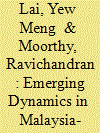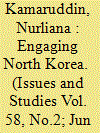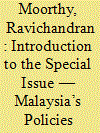|
|
|
Sort Order |
|
|
|
Items / Page
|
|
|
|
|
|
|
| Srl | Item |
| 1 |
ID:
185901


|
|
|
|
|
| Summary/Abstract |
Japan and Malaysia established relations in 1957, the year Malaysia obtained independence from the British. Malaysia has largely benefited through many Japanese assistance programs, and in return, the country has remained one of Japan’s closest friends in Southeast Asia. During his first premiership, Mahathir introduced the Look East Policy (LEP) as a major foreign policy re-direction, moving away from the Western approach adopted by his predecessors. Nevertheless, bilateral relations plateaued during the reign of the two successive prime ministers Abdullah Badawi and Najib Razak primarily as a result of the changing regional geopolitical landscape. Malaysia moved closer towards an emerging China. However, the May 2018 general election paved the way for Mahathir to resume control of the country for the second time after a lapse of 15 years. Within less than a year, Japan started to bounce back in Malaysia’s political and strategic sensors. Japan is set to play a greater role in the Malaysian economic landscape, especially with its assistance of low-interest samurai bonds to aid the debt-stricken new Malaysian government. For Japan, this rekindling of old friendship could not have been more timely and may translate into greater support to Japan’s initiatives for regional peace and for a free and open Indo-Pacific region. This paper examines the evolving trends in bilateral relations between Japan and Malaysia in the second Mahathir administration. More specifically, it explicates the external and domestic sources which have affected and recalibrated Malaysia’s Japan policy in the context of a shifting regional strategic milieu as well as an evolving post-election domestic political landscape. This paper contends that the emerging dynamics and trajectories in Malaysia’s relations with Japan under the nascent “Mahathirism 2.0” period have been primarily shaped by the country’s ruling elite’s perceptions of her external conditions in the context of East Asia’s changing power dynamics, tempered by their domestic political considerations and leadership traits/idiosyncrasies. It further argues that despite the newly-minted Pakatan Harapan (PH) government’s visible foreign policy adjustments indicating a possible shift of emphasis from China towards Japan, such recalibrations are yet to alter the fundamentals of Malaysia’s Northeast Asia policy generally and its Japan policy specifically, an area in which the effects of structural conditions (proximity, power asymmetry, rivalries and uncertainties) continue to be informed by the Malaysian ruling elite’s domestic political considerations as they strive as much to optimize the country’s external interests as to consolidate their domestic legitimation.
|
|
|
|
|
|
|
|
|
|
|
|
|
|
|
|
| 2 |
ID:
185902


|
|
|
|
|
| Summary/Abstract |
The assassination of Kim Jong Nam in 2017 brought about a significant change in the diplomatic relationship between Malaysia and North Korea. Although diplomatic relations between the two countries were downgraded due to the incident, current changes would likely encourage the resumption of diplomatic ties. This study applies a poliheuristic decision-making analysis of Malaysia’s diplomatic relations with North Korea. It argues that Malaysia’s choice to establish diplomatic ties with North Korea was made consistent with the strong sense of neutrality that has shaped Malaysia’s foreign policy. Despite the increased security threat North Korea is perceived as globally, it was not until the assassination attempt that there was any regression in diplomatic relations between the two countries. Poliheuristic theory can also be utilized to explain why Malaysia will most likely proceed with reopening the Malaysian Embassy in Pyongyang as this is an alternative that would present Malaysia with continued gain in consideration of both its emphasis on diplomacy and neutrality in its foreign policy.
|
|
|
|
|
|
|
|
|
|
|
|
|
|
|
|
| 3 |
ID:
185899


|
|
|
| 4 |
ID:
185898


|
|
|
|
|
| Summary/Abstract |
Effective pandemic response has become an increasingly important focus for research in the face of the COVID-19 pandemic. While there are a number of variables that may be considered as influencing effective response, this paper focuses on the potential impact of an “authoritarian advantage” in achieving an effective response in the period prior to pharmaceutical interventions being available with China as a case study. In essence, this paper explores whether China enjoys an authoritarian advantage, and if so, how it functions.
This study compares China’s SARS-CoV-1 (2003) response with its SARS-CoV-2 (2019) response by exploring the impact of the authoritarian advantage on the state’s ability to effectively engage three key explanatory variables — centralized decision-making powers, public support and media engagement.
|
|
|
|
|
|
|
|
|
|
|
|
|
|
|
|
| 5 |
ID:
185900


|
|
|
|
|
| Summary/Abstract |
This paper examines Malaysia’s evolving relations with China during the second Mahathir administration from 2018 to 2020 in political, economic, and security aspects. While much of the foreign media portrayed the unprecedented change of government in May 2018 as an instance of “pushing back” against China, this paper refutes this simplistic view. It argues that while there were uncertainties in bilateral relations in the initial period following the election, the “Mahathir 2.0” administration ultimately renewed and reaffirmed its relationship with China on a positive note. Economically, the Mahathir 2.0 administration sought to renegotiate Malaysia’s economic relationship with China to align it with its political economy agenda. In terms of security, Prime Minister Mahathir had at first sought to form a new normative framework but later came to adopt a more assertive stand in the South China Sea dispute. At the same time, he showed a continued (but cautious) willingness to engage in defense diplomacy and military-to-military relations with China. This paper analyzes these developments in light of the theoretical framework of neoclassical realism which takes into account the systemic, domestic, and personal factors in influencing the country’s foreign policy. It also interprets these developments as exercises in hedging by a small power in an age of increasing uncertainty.
|
|
|
|
|
|
|
|
|
|
|
|
|
|
|
|
|
|
|
|
|